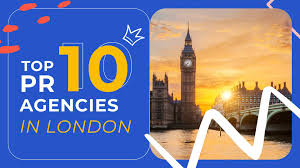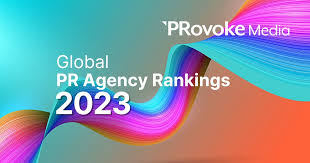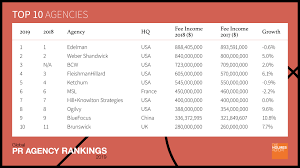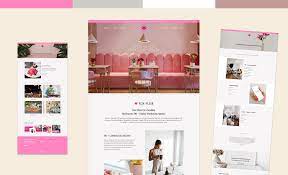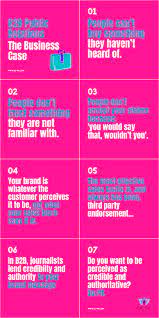The Importance of a Well-Designed PR Agency Website
In today’s digital age, having a strong online presence is crucial for any business. This holds especially true for public relations (PR) agencies, whose primary goal is to help clients effectively communicate their messages to the public and build their brands. A well-designed PR agency website plays a pivotal role in achieving these objectives.
First impressions matter, and your website is often the first point of contact for potential clients. It serves as a virtual storefront that showcases your agency’s expertise, services, and achievements. A visually appealing and user-friendly website can instantly captivate visitors and leave a lasting positive impression.
One of the key elements of an effective PR agency website is clear and concise messaging. It should clearly communicate what sets your agency apart from the competition, highlight your areas of expertise, and convey your unique value proposition. By presenting this information in a compelling manner, you can capture the attention of potential clients and convince them that your agency is the right choice for their needs.
Another important aspect to consider when designing a PR agency website is functionality. Visitors should be able to easily navigate through different sections to find the information they are looking for. This includes having an intuitive menu structure, clear call-to-action buttons, and quick access to contact details or inquiry forms. By providing a seamless user experience, you can increase engagement and encourage visitors to take action.
A well-designed PR agency website should also showcase your previous work and success stories. Case studies, testimonials, or client portfolios demonstrate your track record of delivering results. This not only builds credibility but also helps potential clients envision how your agency can help them achieve their goals.
Furthermore, incorporating relevant content on your website can significantly enhance its value. Blog posts or articles that provide insights into industry trends or offer practical tips demonstrate thought leadership and expertise within the PR field. Sharing valuable content not only attracts visitors but also encourages them to return for more information, positioning your agency as a go-to resource.
Lastly, an effective PR agency website should be optimized for search engines. Implementing search engine optimization (SEO) techniques can improve your website’s visibility in search engine rankings, making it easier for potential clients to find you online. This includes using relevant keywords, creating unique and informative meta descriptions, and ensuring fast loading times.
In conclusion, a well-designed PR agency website is a powerful tool for attracting and engaging potential clients. It showcases your expertise, highlights your unique value proposition, and serves as a platform to demonstrate your previous successes. By investing in a visually appealing, user-friendly, and content-rich website that is optimized for search engines, you can effectively position your agency as a leader in the industry and drive business growth.
9 Frequently Asked Questions about PR Agency Websites: A Comprehensive Guide
- How much does a pr agency website cost?
- What features should I look for in a pr agency website?
- What are the benefits of having a pr agency website?
- How do I choose the best pr agency website for my business?
- Can I make changes to my own pr agency website or do I need help from an expert?
- Are there any free options available for creating a pr agency website?
- What type of support is offered by the company providing the pr agency website service?
- How long does it take to set up and launch a new pr agency website?
- Is there any training or advice available to help me manage my own pr agency website effectively?
How much does a pr agency website cost?
The cost of a PR agency website can vary depending on several factors, including the complexity of the design, the number of pages and features required, the level of customization, and the specific needs of your agency. It’s essential to consider these factors when determining the budget for your website.
In general, a basic PR agency website with a simple design and standard features can range from £1,000 to £5,000. This would typically include essential pages such as an about us section, services offered, client portfolio or case studies, contact information, and a blog/news section.
For more complex websites with additional functionalities such as interactive elements, e-commerce capabilities, client login portals, or integration with customer relationship management (CRM) systems, the cost can increase significantly. These types of websites may require custom development work and could range from £5,000 to £20,000 or more.
It’s important to note that these figures are estimates and can vary based on individual circumstances. Factors such as hiring a professional web designer or agency versus using DIY website builders can also influence costs.
When budgeting for your PR agency website, it’s advisable to consult with web design professionals who can provide accurate quotes based on your specific requirements. They will be able to assess your needs and provide you with a more precise estimate tailored to your unique situation.
What features should I look for in a pr agency website?
When looking for a PR agency website, there are several key features that you should consider. These features will help ensure that the website effectively represents the agency and provides a positive user experience for visitors. Here are some important features to look for:
- Clear and Engaging Design: A visually appealing website design is crucial in capturing visitors’ attention. Look for a clean and modern design that reflects the agency’s brand identity. The use of high-quality images, well-chosen typography, and a consistent colour scheme can enhance the overall aesthetic appeal.
- User-Friendly Navigation: Easy navigation is essential for visitors to find the information they need quickly and effortlessly. Look for clear menu structures, intuitive layouts, and logical organization of content. Visitors should be able to navigate through different sections without confusion or frustration.
- Compelling Messaging: The website’s messaging should clearly communicate the agency’s value proposition, expertise, and services. Look for concise and persuasive copywriting that effectively conveys what makes the agency unique and why potential clients should choose them.
- Portfolio or Case Studies: A PR agency’s track record is an important factor in decision-making. Look for a website that showcases previous work through case studies or a portfolio section. This allows potential clients to see real-life examples of successful campaigns or projects undertaken by the agency.
- Testimonials or Client Reviews: Positive feedback from satisfied clients can significantly boost credibility and trustworthiness. Look for a section on the website that highlights testimonials or client reviews, demonstrating the positive experiences of past clients who have worked with the agency.
- Thought Leadership Content: Providing valuable content such as blog posts, articles, or whitepapers demonstrates expertise within the PR industry. Look for a website that offers educational resources or insights into industry trends, showcasing the agency’s thought leadership.
- Contact Information and Inquiry Forms: Easy access to contact details is essential for potential clients who want to get in touch. Look for a website that prominently displays contact information, including phone numbers, email addresses, and social media links. Additionally, an inquiry form can provide a convenient way for visitors to reach out and express their interest.
- Mobile Responsiveness: With the increasing use of mobile devices, it is crucial that the website is responsive and adapts to different screen sizes. A mobile-friendly design ensures that visitors have a seamless experience regardless of the device they are using.
- SEO Optimization: Look for a website that is optimized for search engines. This includes elements such as well-structured URLs, relevant page titles and meta descriptions, proper use of headings and keywords, and fast loading times. SEO optimization helps improve visibility in search engine rankings and increases the chances of attracting organic traffic.
By considering these features when evaluating PR agency websites, you can choose one that effectively represents the agency’s capabilities, engages visitors, and provides a positive user experience.
What are the benefits of having a pr agency website?
Having a PR agency website offers numerous benefits that can significantly contribute to the success and growth of your business. Here are some key advantages:
- Professional Image: A well-designed website helps establish a professional image for your PR agency. It conveys credibility and expertise, giving potential clients confidence in your abilities to handle their communication needs.
- Online Presence: In today’s digital age, having an online presence is essential. A website serves as a virtual storefront, allowing potential clients to find and learn more about your agency at any time, from anywhere in the world.
- Branding and Differentiation: Your website is an opportunity to showcase your unique brand identity and differentiate yourself from competitors. Through visual design, messaging, and content, you can communicate what sets your agency apart and why clients should choose you.
- Showcasing Expertise: A PR agency website provides a platform to showcase your expertise and highlight successful case studies or client testimonials. This helps build trust with potential clients by demonstrating your track record of delivering results.
- Lead Generation: An effective website acts as a lead generation tool by attracting potential clients through search engine optimization (SEO), compelling content, and clear call-to-action buttons. It allows visitors to express interest or request more information, providing valuable leads for your business.
- Thought Leadership: Your website can serve as a hub for thought leadership content such as blog posts or articles that offer insights into industry trends or share valuable tips. By sharing knowledge and expertise, you position yourself as an authority in the field, attracting both clients and media attention.
- Accessibility and Convenience: A website provides 24/7 accessibility for visitors to learn about your services, browse case studies or portfolios, and contact you at their convenience. This flexibility allows potential clients to gather information before making decisions or reaching out for further discussions.
- Cost-Effective Marketing: Compared to traditional marketing methods like print advertisements or direct mail, a website offers a cost-effective marketing channel. It allows you to reach a wider audience, engage with potential clients, and promote your agency’s services without significant ongoing expenses.
- Networking and Partnerships: A website can facilitate networking and partnership opportunities by showcasing your agency’s affiliations, collaborations, or industry memberships. This can attract like-minded professionals or potential collaborators who are interested in working with your agency.
- Analytics and Insights: By utilizing website analytics tools, you can gather valuable data on visitor behavior, demographics, and conversion rates. This information helps you understand your audience better, make data-driven decisions, and optimize your website for improved performance.
In summary, having a PR agency website offers numerous benefits including establishing a professional image, attracting leads, showcasing expertise, facilitating networking opportunities, and providing valuable insights. It is an essential tool in today’s digital landscape for building brand awareness and driving business growth.
How do I choose the best pr agency website for my business?
Choosing the best PR agency website for your business requires careful consideration and evaluation. Here are some key factors to consider when making your decision:
- Portfolio and Experience: Review the agency’s portfolio and past clients to assess their experience in your industry or niche. Look for case studies or success stories that demonstrate their ability to deliver results similar to what you’re seeking.
- Services Offered: Consider the range of services offered by the PR agency. Ensure they align with your specific needs, whether it’s media relations, crisis management, content creation, social media management, or other PR-related services.
- Reputation and Reviews: Research the agency’s reputation in the industry. Look for reviews and testimonials from previous clients to gain insights into their level of professionalism, communication skills, and overall satisfaction with their services.
- Website Design and User Experience: Evaluate the design and functionality of the agency’s website itself. A well-designed website with intuitive navigation reflects their attention to detail and commitment to a positive user experience.
- Content Quality: Assess the quality of content on their website, such as blog posts or articles. This can give you an idea of their expertise, thought leadership, and ability to create compelling content that resonates with audiences.
- Communication Approach: Consider how the agency communicates with potential clients during the evaluation process. Are they responsive, attentive, and transparent? Effective communication is vital for a successful working relationship.
- Budget Considerations: Determine if the agency’s pricing structure aligns with your budgetary constraints. While it’s important to consider cost-effectiveness, remember that quality services often come at a higher price.
- Compatibility and Chemistry: Schedule meetings or calls with shortlisted agencies to gauge compatibility and chemistry between your team and theirs. A good working relationship is essential for effective collaboration.
- Industry Recognition: Look for any industry awards or recognition that the agency has received. This can be an indicator of their expertise and credibility within the PR field.
- Client References: Request references from the agency and reach out to their current or past clients to get direct feedback on their experiences. This can provide valuable insights into the agency’s strengths and weaknesses.
By carefully considering these factors, you can make an informed decision when choosing the best PR agency website for your business. Remember that selecting the right agency is a crucial step towards achieving your communication goals and building a strong brand presence.
Can I make changes to my own pr agency website or do I need help from an expert?
Making changes to your PR agency website can be done by yourself, especially if you have some experience or knowledge in website design and development. Many website-building platforms offer user-friendly interfaces that allow you to make updates, add content, and modify certain aspects of your site without extensive technical expertise.
However, if you want to implement more complex changes or enhancements to your website, it may be beneficial to seek help from a web design expert or developer. They can provide guidance on best practices, ensure proper functionality and responsiveness across different devices, and help optimize your site for better performance and search engine visibility.
Additionally, if you are unsure about the design elements or user experience of your website, an expert can provide valuable insights and recommendations based on their industry knowledge and expertise. They can help you create a visually appealing and user-friendly interface that aligns with your brand identity and effectively communicates your agency’s message.
Ultimately, the decision to make changes on your own or seek professional assistance depends on the complexity of the modifications you want to make and your comfort level with website design. It’s always a good idea to assess your own skills and resources before deciding whether external help is necessary.
Are there any free options available for creating a pr agency website?
Yes, there are free options available for creating a PR agency website. Here are a few popular ones:
- WordPress.com: WordPress.com offers a free platform that allows you to create and customize your website using their pre-designed templates. While the free plan has some limitations, it provides essential features and functionality to get started.
- Wix: Wix is a user-friendly website builder that offers a free plan with drag-and-drop functionality. It provides a variety of templates and customization options to create a professional-looking website for your PR agency.
- Weebly: Weebly is another popular website builder that offers a free plan with easy-to-use tools and templates. It allows you to create a responsive and visually appealing website without any coding knowledge.
- Google Sites: Google Sites is a simple and straightforward option for creating basic websites. It’s free to use and integrates seamlessly with other Google services, making it convenient if you already use Google’s suite of tools.
While these free options provide the basic tools needed to build a website, it’s important to note that they may have limitations in terms of storage space, domain name options, or advanced features compared to paid plans or custom-built websites. However, they can still be an excellent starting point for establishing an online presence for your PR agency without incurring additional costs.
What type of support is offered by the company providing the pr agency website service?
The company providing PR agency website services typically offers comprehensive support to ensure that clients have a seamless experience throughout the website development process and beyond. Here are some common types of support offered:
- Consultation: The company will engage in initial consultations to understand the specific needs and goals of the PR agency. They will provide expert guidance on website design, functionality, content strategy, and overall branding.
- Custom Design and Development: The company will create a unique and visually appealing website design tailored to the PR agency’s brand identity. They will handle all aspects of development, including coding, responsive design for mobile devices, and integration of necessary features.
- Content Creation: The company may offer content creation services, including copywriting, graphic design, and multimedia production. This ensures that the website content is engaging, informative, and aligned with the PR agency’s messaging.
- SEO Optimization: To improve online visibility and attract organic traffic, the company may provide SEO optimization services. This includes keyword research, on-page optimization techniques, meta tag optimization, and other strategies to enhance search engine rankings.
- Training and Support: Once the website is launched, the company may offer training sessions or documentation to help PR agency staff manage and update the website independently. They also provide ongoing technical support for any issues or questions that may arise.
- Analytics and Reporting: The company can set up analytics tools to track website performance metrics such as traffic sources, user behavior, conversions, and more. They may also provide regular reports on these metrics to help the PR agency assess the effectiveness of their online presence.
- Maintenance and Updates: Websites require regular maintenance to ensure optimal performance and security. The company may offer maintenance packages that include software updates, security monitoring, backups, bug fixes, and other necessary updates.
- Additional Services: Some companies may offer additional services such as social media integration, email marketing integration, e-commerce functionality setup (if needed), and ongoing digital marketing support to help the PR agency maximize their online presence.
It’s important to note that the specific support offered may vary depending on the company providing the PR agency website service. It’s recommended to inquire about the available support options and discuss specific requirements during the initial consultations with the service provider.
How long does it take to set up and launch a new pr agency website?
The time it takes to set up and launch a new PR agency website can vary depending on several factors, including the complexity of the website, the availability of resources, and the level of customization required. However, here is a general timeline that can give you an idea:
- Planning and Strategy (1-2 weeks): This phase involves defining the goals and objectives of your website, conducting research on target audience and competitors, creating a sitemap, and outlining the overall design and functionality.
- Design and Development (4-8 weeks): During this phase, the website’s visual design is created based on your branding guidelines. The development team then works on coding and implementing the design into a functional website. This includes setting up navigation menus, integrating content management systems (CMS), creating contact forms, etc.
- Content Creation (2-4 weeks): Content creation involves writing compelling copy for different sections of your website, including about us pages, service descriptions, case studies or portfolios, blog posts or articles if applicable. It also includes sourcing or creating relevant images or videos.
- Testing and Quality Assurance (1-2 weeks): Before launching your website to the public, thorough testing is essential to ensure that all features are working correctly across different devices and browsers. This phase also includes checking for any broken links or errors in content.
- Launch (1 day): Once all testing is complete and everything is in order, it’s time to make your website live! This involves uploading all files to a hosting server, configuring domain settings if necessary, setting up analytics tools for tracking visitor data, etc.
It’s important to note that these timelines are estimates and can vary depending on project scope and resource availability. Additionally, ongoing maintenance and updates may be required after the initial launch to keep your website optimized and up-to-date.
To ensure a smooth process from start to finish, it’s advisable to work closely with a professional web development team or agency that specializes in creating PR agency websites. They can guide you through each step, provide expertise, and help you meet your desired launch timeline.
Is there any training or advice available to help me manage my own pr agency website effectively?
Absolutely! Managing your own PR agency website effectively requires a combination of knowledge, skills, and ongoing learning. Here are some training and advice options to help you:
- Online Courses: Many online platforms offer courses specifically tailored to website management, web design, and digital marketing. Look for courses that cover topics such as website design principles, search engine optimization (SEO), content creation, user experience (UX) design, and analytics. Platforms like Udemy, Coursera, and LinkedIn Learning offer a wide range of courses taught by industry experts.
- Webinars and Workshops: Keep an eye out for webinars and workshops conducted by professionals in the field of website management or digital marketing. These events often provide valuable insights, best practices, and practical tips for optimizing your website’s performance.
- Blogs and Resources: Stay updated with industry blogs and resources that focus on web design, SEO, content marketing, and digital strategy. Websites like Moz.com, NeilPatel.com, HubSpot Blog, Search Engine Journal, and Yoast provide comprehensive guides and articles on various aspects of website management.
- Networking Groups: Join online communities or networking groups where professionals share their experiences in managing PR agency websites. These groups can be found on platforms like LinkedIn or Facebook. Engaging in discussions with fellow professionals can provide valuable insights and advice.
- Consult with Experts: If you have specific challenges or questions about managing your PR agency website effectively, consider consulting with experts in the field. Digital marketing agencies or consultants specializing in website management can offer personalized advice tailored to your unique needs.
- Continuous Learning: The digital landscape is constantly evolving; therefore, it’s crucial to stay updated with the latest trends and best practices in website management. Follow industry influencers on social media platforms like Twitter or subscribe to newsletters from reputable websites to receive regular updates.
Remember that managing a PR agency website effectively is an ongoing process that requires regular monitoring, analysis, and optimization. By investing time and effort into learning and implementing effective strategies, you can ensure that your website remains a powerful tool for attracting clients and achieving your business goals.



